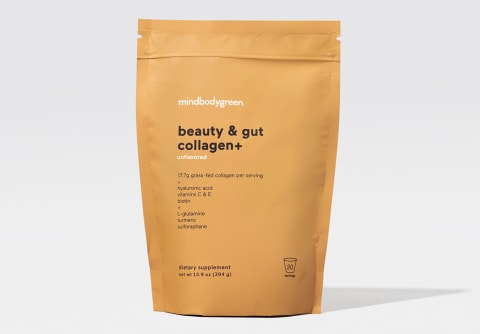Advertisement
Can You Take Too Much Collagen? The Answer May Surprise You


A daily collagen routine is one of the most low-lift things you can do for your overall well-being. With this powder ritual, you can help with skin hydration and elasticity, hair health, nail strength, gut support, bone and joint health, and muscle mass.* Given these profound benefits, you might want to toss collagen in your coffee, blend it into your smoothie, add it to baked goods, and fold it into your homemade granola—all in one day. The more collagen you incorporate into your routine, the more benefits you'll see...right?
Not exactly. Collagen has few side effects, but is it possible to consume too much? Here's how to tell if you're going overboard on collagen, and exactly how much you should take.
Can you take too much collagen?
Technically, yes, you can get too much of a good thing. It's possible to go overboard with basically any nutrient or substance (even water!), and despite collagen's robust safety profile1, let's not forget that collagen is a protein source—and excess protein intake, in general, should be avoided. "For some, too much protein can be upsetting to the stomach. Too much protein (or any macronutrient) can contribute to fat stores, and protein metabolism requires healthy kidney function to process the urea," says mbg's vice president of scientific affairs Ashley Jordan Ferira, Ph.D., RDN.
We're also not going to tell you that gulping down 10 collagen smoothies in one day offers 10 times the benefits. That would just be silly. Taking more supplements of any kind won't yield faster results. It's better to consume clinically meaningful and helpful amounts (i.e., those rooted in scientific research).
Thankfully, your body has the ability to absorb and balance the nutrients it needs. "[Most] foods, supplements, etc., consumed in excessive amounts will be absorbed, filtered out, and excreted—but not without side effects," longevity dietitian Ella Davar, R.D., CDN, tells mbg.
And while that "check and balance" system is definitely true for certain micronutrients, when it comes to macronutrients, over-consuming collagen means a lot more protein than your body may need. And as Ferira alluded to above, too much of any macro isn't a good thing after all.
All that to say: Yes, it is possible to take too much collagen. However, not taking enough might not give you the well-rounded health benefits you're after. So how do you find your sweet spot? Here's what the science says regarding each health-support area:
- Skin: Studies show that a range of 2.5 to 10 grams per day can be beneficial for skin support2.*
- Muscle: Studies show that 15 to 20 grams per day can help muscle mass3, muscle strength4, and soreness after exercise5.*
- Joint: 2.5 to 5 grams per day has been shown to help joint support6—however, if you are taking UC-II specifically, you need only 40 milligrams per day7.*
- Bone: The available research suggests that 5 grams per day provides bone support8.*
If you want to cover all of your bases, finding a collagen supplement with 10 to 20 grams of hydrolyzed collagen peptides seems to be the best way to go. (mindbodygreen's beauty & gut collagen+ powder, for what it's worth, offers 17.7 grams of grass-fed hydrolyzed collagen peptides, along with seven other beauty and gut-centric bioactives, micronutrients, and antioxidants.)
That way, you can be sure you're getting a clinically effective dose—still, you don't want to scoop a serving in your coffee, smoothie, oatmeal, and midday matcha in one day. "Everything in moderation, even collagen," adds Ferira.
The takeaway.
Like any other supplement or substance, it is possible to consume too much collagen. However, it's a delicate dance—you also want to make sure you're consuming enough to reap the benefits. We say make sure you find a robust, clinically backed supplement you can take most every day so you know you're getting enough of a dose without repeating scoops.
8 Sources
- https://www.ncbi.nlm.nih.gov/pmc/articles/PMC7070905/
- https://jddonline.com/articles/dermatology/S1545961619P0009X
- https://pubmed.ncbi.nlm.nih.gov/26353786/
- https://pubmed.ncbi.nlm.nih.gov/31010031/
- https://pubmed.ncbi.nlm.nih.gov/30783776/
- https://www.ncbi.nlm.nih.gov/pmc/articles/PMC6356409/
- https://pubmed.ncbi.nlm.nih.gov/26822714/
- https://pubmed.ncbi.nlm.nih.gov/29337906/
Watch Next
Enjoy some of our favorite clips from classes
Enjoy some of our favorite clips from classes
What Is Meditation?
Mindfulness/Spirituality | Light Watkins
Box Breathing
Mindfulness/Spirituality | Gwen Dittmar
What Breathwork Can Address
Mindfulness/Spirituality | Gwen Dittmar
The 8 Limbs of Yoga - What is Asana?
Yoga | Caley Alyssa
Two Standing Postures to Open Up Tight Hips
Yoga | Caley Alyssa
How Plants Can Optimize Athletic Performance
Nutrition | Rich Roll
What to Eat Before a Workout
Nutrition | Rich Roll
How Ayurveda Helps Us Navigate Modern Life
Nutrition | Sahara Rose
Messages About Love & Relationships
Love & Relationships | Esther Perel
Love Languages
Love & Relationships | Esther Perel


















